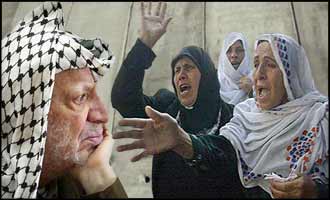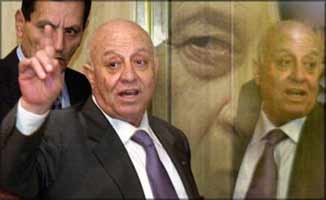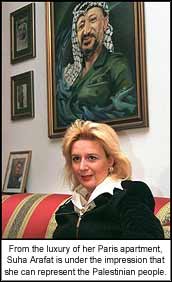Hasan Abu Nimah
The current situation of the Palestinian National Authority (PNA) is critically precarious, and hardly tenable. Israel has destroyed much of the fragile structure built as part of the Oslo process. It has been systematically destroying the Palestinian security forces. It reoccupied most of the little land which was earlier put under the control of the authority. It almost bankrupted the authority by holding the taxes collected on behalf of the authority, for the authority, and used it as a punishment as well as a pressure tool against the authority. And it has placed the PNA president under a humiliating siege, which turned, paradoxically, an “acceptable” alternative to deportation.

The people are crying out for leadership in their struggle against illegal occupation. The lame duck Arafat can do no more than look on.
Israel seems to be comfortable with a totally ineffective authority under siege, while officially still responsible for the burdensome costs of the occupation. This situation has enabled Israel, and it still does, to blame the authority, not the occupation, for the Palestinian daily suffering, and for the ever deteriorating security situation.
The purpose of the frequent Israeli leaks that the PNA is about to collapse, must be to disguise this reality. The PNA should not allow this abnormal situation of reducing its role from a “liberation movement” and a state-building administration to a mere security agent for the occupier, to continue. Unfortunately, there are no signs that any such thing is likely to happen.
The daily Israeli raids on the Palestinians, the killings, the demolition of houses, the arrests, the closures, the destruction of trees and farmland, the construction of the apartheid wall, the expansion of colonies and colonisation and the torturing collective measures and atrocities further expose the failure of the authority to either offer the minimum required amount of protection to its people under attack or to allow them to defend themselves.
In fact, the PNA does not dare raise a finger in the face of any Israeli aggression, only profess the usual harmless protests, the condemnations and the expressions of concern over the viability of the peace process, having repeatedly committed itself to renouncing violence even if that meant ? and actually it did mean ? renouncing the legitimate right to self defence. Already on the defensive politically, the authority’s position has been further eroded on the external front, in particular, as a result of its inability to meet an outstanding undertaking of dismantling the Palestinian “terrorists”: Hamas, Al Jihad Al Islami and the Fateh military wing.
With so little left to do on the home front, Prime Minister Ahmed Qureia has recently embarked on an Arab and a European tour. Apart from movement for its own sake, as a better alternative to stagnation and political bankruptcy, Qureia must have been motivated by the dual hope of, first, warding off a severe financial crisis facing the authority, urging more European and possibly Arab funds to help and, second, lobbying for any possible political help to resuscitate a dying peace process. The resumption of any form of negotiations, no matter how futile, the head of the Palestinian administration believes, would help resuscitate the authority itself by temporarily restoring its lost raison d’?tre.

Prime Minister Qureia is trying to show Sharon that he has friends in Europe. Ariel Sharon knows just how deep that friendship goes.
It is not clear how much success Qureia’s mission has achieved, other than some quite significant, though still symbolic, gestures of verbal objections to the Sharon apartheid wall. Otherwise, Qureia was urged to do more by way of dismantling the Palestinian “terrorist” organisations and curbing violence. And he was also advised not to delay any further his awaited meeting with Sharon ? both prospects would evidently do him more harm than good. His announcement, following his return home, that preparations were already under way for the planned meeting with Sharon attest to the fact that he is heeding his former hosts’ advice while ignoring its possible consequences.
Coincidentally, greater harm had already been caused by the eruption of new alleged corruption scandals involving the PNA leadership, with particular focus on Qureia himself.
While the prime minister was fervently complaining in the European capitals about the Israeli apartheid wall and its devastating effects on Palestinian lives and rights, the Associated Press was reporting that a Qureia family owned cement company in his home town of Abu Dis was selling cement to Jewish settlements and for the construction of the very wall Qureia had regularly been fighting. The AP quoted (Feb. 11) Israeli channel ten television showing cement mixers leaving the Qureia Al Quds cement company in Abu Dis and heading towards the nearby Israeli settlement of Maaleh Adumin. Apparently the TV report (according to the AP report) had also said that “[Qureia] was providing the cement to build concrete slabs right outside his house in Abu Dis “to help build the “contentious West Bank barrier.”
A Palestinian lawmaker was quoted by the AP as saying “there was evidence that Qureia was selling cement to Maaleh Adumin”, and that his suspicion was strengthened due to the fact that Qureia had transferred ownership of the company to another member of his family just a few months ago.

Qureia’s support from Palestinians has not been tested in an election. Under allegations of treasonous corruption, it has never been less secure.
The allegations were obviously denied by Qureia and a Palestinian parliamentary committee is investigating whether his family “has been selling concrete to Jewish settlements in the West Bank”, and “if this cement was used to build the barrier or any other Israeli needs”. Jamil Tarifi, a Palestinian Cabinet minister is also “among those being investigated”, according to unnamed Palestinian officials quoted by the AP report.
The other devastating blow to the staggering position of the PNA is the simultaneous revelation in France that huge money transfers, totalling 9 million euros, were made from accounts in Switzerland to two private accounts of Suha Arafat in Paris. The French concern over the possibility of money laundering may not be the most difficult aspect of the scandal and it could easily be dealt with. What remains to be addressed on the Palestinian side is questions such as why the first lady is living in Paris instead of staying with her people, sharing their suffering; where did this money come from if it is not the money of the impoverished Palestinian people; and why should that much ? assuming that that much only has been transferred ? be allocated to Mrs Arafat and her daughter, and to sustain her lavish Parisian lifestyle, when that much can support 6,000 average Palestinian families among those who survive on less than $6 a day, for an entire year?

Suha Arafat has indeed addressed some of these questions, although she seems to have missed the point entirely, informing Al Hayat newspaper (Feb. 12, 2004): “What is so strange for the Palestinian president to send any amount of money to his family and his wife who is protecting the Palestinian interests abroad, and the money came and will come legally.”
What may look not so strange to Mrs Arafat is very strange and very shocking to the majority of the Palestinians. And if Mrs Arafat is indeed separating herself from her country and her people for serving the interests of both, she would have only needed to declare that much earlier, to prevent any “ill minded” suspicions.
Erupting at such a critical time for the PNA, neither the denial of the prime minister nor the “clarifications” of the first lady may have much effect in clearing the atmosphere of the thickening clouds of suspicion and mistrust. And in light of similar precedent, one wonders if the parliamentary investigation would fare any better either.
Over six years ago, a similar Palestinian parliamentary panel conducted an investigation of the PNA corruption. (The Times, July 30, 1997). The nine-member panel of the Palestinian Legislative Council had, at the time, acted upon the Palestinian State Controller’s report that found that nearly half of the authority’s $326 million 1997 budget had been lost through corruption or financial mismanagement. The panel had “called for the dismissal of Arafat’s entire Cabinet and at least for one minister to stand trial”; it called for charges against other implicated ministers, whose names were not disclosed, and for putting several others under investigation. The worst mismanagement cited was in the Civil Affairs Ministry, headed by Tarifi, and the Planning Ministry, headed by Nabil Shaath, according to The Times.
Over six years since, Tarifi is still in the Cabinet and once more subject to parliamentary investigation for corruption. Shaath has never left the Cabinet and his position has been steadily advancing.
An administration which loudly brags about the fact that it has been democratically elected should be able to observe the simplest principles of democracy: when you fail you leave. The good thing about democracy is that it grants the people the right to evaluate the performance of the leaders they elect and to vote them out of office once proved incompetent.
The PNA, which has only been reaping failures, indulging in opportunism and corruption, dedicating all its effort to its own survival at any a cost, even if that meant at the expense of the rights of its people, is neither leaving voluntarily nor is it allowing years-overdue elections to decide its fate. It is high time that, one way or another, this failed leadership should let the beleaguered Palestinians choose the right leaders.
The writer is former ambassador and permanent representative of Jordan at the United Nations.
Article courtesy of The Jordan Times